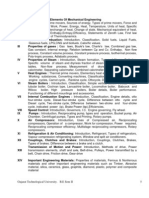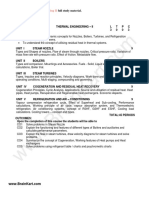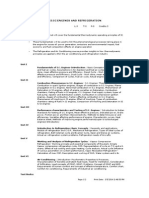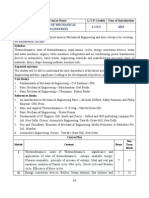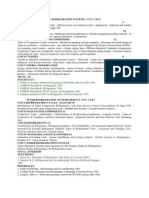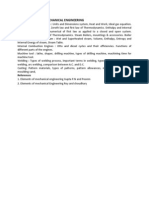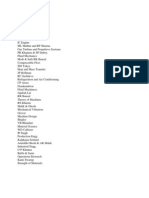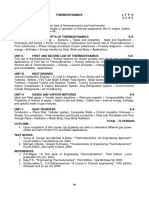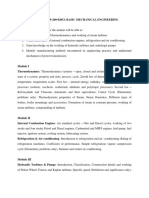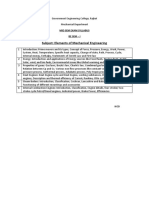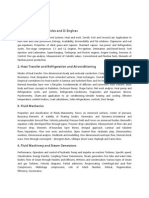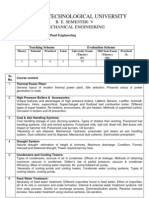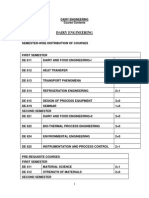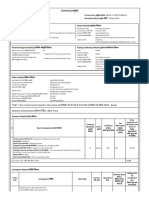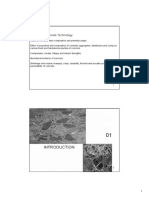0 ratings0% found this document useful (0 votes)
ET COurse2
ET COurse2
Uploaded by
technicalboot4999This document outlines the subjects covered in the Elements of Mechanical Engineering course. The topics include: prime movers and energy sources; properties of gases, steam, and heat engines; steam boilers; internal combustion engines; speed control; pumps; air compressors; refrigeration and air conditioning; couplings, clutches, and brakes; transmission of motion and power; and important engineering materials. Reference books on thermal science, mechanical engineering fundamentals, and properties of materials are also listed.
Copyright:
© All Rights Reserved
Available Formats
Download as PDF, TXT or read online from Scribd
Download as pdf or txt
ET COurse2
ET COurse2
Uploaded by
technicalboot49990 ratings0% found this document useful (0 votes)
This document outlines the subjects covered in the Elements of Mechanical Engineering course. The topics include: prime movers and energy sources; properties of gases, steam, and heat engines; steam boilers; internal combustion engines; speed control; pumps; air compressors; refrigeration and air conditioning; couplings, clutches, and brakes; transmission of motion and power; and important engineering materials. Reference books on thermal science, mechanical engineering fundamentals, and properties of materials are also listed.
Copyright
© © All Rights Reserved
Available Formats
PDF, TXT or read online from Scribd
Share this document
Did you find this document useful?
Is this content inappropriate?
This document outlines the subjects covered in the Elements of Mechanical Engineering course. The topics include: prime movers and energy sources; properties of gases, steam, and heat engines; steam boilers; internal combustion engines; speed control; pumps; air compressors; refrigeration and air conditioning; couplings, clutches, and brakes; transmission of motion and power; and important engineering materials. Reference books on thermal science, mechanical engineering fundamentals, and properties of materials are also listed.
Copyright:
© All Rights Reserved
Available Formats
Download as PDF, TXT or read online from Scribd
Download as pdf or txt
0 ratings0% found this document useful (0 votes)
ET COurse2
ET COurse2
Uploaded by
technicalboot4999This document outlines the subjects covered in the Elements of Mechanical Engineering course. The topics include: prime movers and energy sources; properties of gases, steam, and heat engines; steam boilers; internal combustion engines; speed control; pumps; air compressors; refrigeration and air conditioning; couplings, clutches, and brakes; transmission of motion and power; and important engineering materials. Reference books on thermal science, mechanical engineering fundamentals, and properties of materials are also listed.
Copyright:
© All Rights Reserved
Available Formats
Download as PDF, TXT or read online from Scribd
Download as pdf or txt
You are on page 1/ 2
Subject code: 110006
Elements Of Mechanical Engineering
I Introduction: Prime movers, Sources of energy, Types of prime movers, Force and
mass, Pressure, Work, Power, Energy, Heat, Temperature, Units of heat, Specific
heat capacity, Interchange of heat, Change of state, Mechanical equivalent of heat,
Internal energy, Enthalpy,Entropy,Efficiency, Statements of Zeroth Law, First law
and Second Law of Thermodynamics.
II Fuels and Combustion: Introduction, Classification, Solid fuels, Liquid Fuels,
Gaseous fuels, LPG,CNG and biofuels ,Calorific values.
III Properties of gases : Gas laws, Boyle's law, Charle's law, Combined gas law,
Gas constant, Internal energy, Relation between Cp and Cv, Enthalpy, Non flow
process, Constant volume process, Constant pressure process, Isothermal process,
Poly-tropic process, Adiabatic process.
IV Properties of Steam : Introduction, Steam formation, Types of Steam, Enthalpy,
Specific volume of steam and dryness fraction of steam , Internal energy, Steam
tables, Non-flow process. Measurement of dryness fraction, Throttling
calorimeter, Separating calorimeter, Combined calorimeter.
V Heat Engines : Thermal prime movers, Elementary heat engines, Sources of heat,
Working substances, Converting machines, Classification of heat engines, Heat
engine cycles, Carnot cycle, , Rankine cycle, Ottocycle, Diesel cycle.
VI Steam Boilers : Introduction, Classification, Simple vertical boiler, Vertical multi-
tubular boiler, Cochran type, Lancashire boiler, Locomotive boiler, Babcock and
Wilcox boiler, High pressure boilers, Boiler details, Boiler performance.
Functioning of different mountings and accessories.
VII Internal Combustion Engines : Introduction, Classification, Engine details, otto
four-stroke cycle, Diesel-four-stroke cycle, Difference between otto cycle and
Diesel cycle, Two-stroke cycle, Difference between two-stroke and four-stroke
cycle, indicated power (ip), Brake Power (bp),Efficiencies.
VIII Speed Control: Introduction, Governors, I.C. Engine governing, Fly wheel.
IX Pumps : Introduction, Reciprocating pump, types and operation, Bucket pump, Air
Chamber, Centrifugal pumps, Types and Priming, Rotary pumps.
X Air Compressors: Introduction, Uses of Compressed air, Reciprocating
compressors, Operation of a compressor, Work for compression, Power required,
Reciprocating compressor efficiency, Multistage reciprocating compressors, Rotary
compressors.
XI Refrigeration & Air Conditioning: Introduction, Refrigerant, Types of refrigerators,
Vapour compression refrigerating system, Window and split air conditioners.
XII Couplings, Clutches and Brakes: Introduction, Couplings, Clutches, Brakes,
Types of brakes. Difference between a brake and a clutch.
Transmission of Motion and Power: Introduction, Methods of drive, Power
XIII transmission elements, shaft and axle, Belt-drive, Pulleys, Power transmitted by a
belt, Chain drive, Friction drive, Gear drive
XIV Important Engineering Materials: Properties of materials, Ferrous & Nonferrous
materials and other important engineering materials such as Timber, Abrasive
material, silica, ceramics, glass, graphite, diamond, plastic, polymer and composite
material
Gujarat Technological University. B.E Sem II 5
Reference Books:
I Elements of Mechanical Engineeringby K.P.Roy and Prof.S.K . Hajra Chaudhary ,
Media Promoters and Publishers Pvt.Ltd.Bombat
II Introduction to Engineering Materials by B.K. Agrawal Tata McgraHill Publication
New Delhi
III Thermal Science and Engineering by Dr. D.S. Kumar, S.K. Kataria & sons
Publication New Delhi
IV Fundamental of Mechanical Engineering by G.S. Sawhney, Prentice Hall
of India Publication New Delhi
V Thermal Engineering by R.K. Rajput ,S.Chand Publication New Delhi
Gujarat Technological University. B.E Sem II 6
You might also like
- Deloitte - IT Capability Model Overview - Canada100% (1)Deloitte - IT Capability Model Overview - Canada19 pages
- Be8256 Basic Mechanical Engineering SyllabusNo ratings yetBe8256 Basic Mechanical Engineering Syllabus1 page
- Mec239:Applied Thermal Engineering: Page:1/1No ratings yetMec239:Applied Thermal Engineering: Page:1/11 page
- Me-311 Transport Phenomenon Unit I Introduction and ConductionNo ratings yetMe-311 Transport Phenomenon Unit I Introduction and Conduction5 pages
- 376 - ME8595 Thermal Engineering II - Anna University 2017 Regulation SyllabusNo ratings yet376 - ME8595 Thermal Engineering II - Anna University 2017 Regulation Syllabus3 pages
- SSM Institute of Engineering and Technology Department of Mechanical EngineeringNo ratings yetSSM Institute of Engineering and Technology Department of Mechanical Engineering11 pages
- Gujarat Technological University: Semester - I/II Subject Name: Basic Mechanical EngineeringNo ratings yetGujarat Technological University: Semester - I/II Subject Name: Basic Mechanical Engineering3 pages
- 11me919 Power Plant Engineering LTPCM 3 0 0 3 100No ratings yet11me919 Power Plant Engineering LTPCM 3 0 0 3 1007 pages
- KTU BASICS OF MECHANICAL ENGINEERING SyllabusNo ratings yetKTU BASICS OF MECHANICAL ENGINEERING Syllabus2 pages
- ME6352 Manufacturing Technology LTPC 3 0 0 3 ObjectivesNo ratings yetME6352 Manufacturing Technology LTPC 3 0 0 3 Objectives14 pages
- Subject: Elements of Mechanical Engineering: Mid Sem Exam Syllabus Be Sem - INo ratings yetSubject: Elements of Mechanical Engineering: Mid Sem Exam Syllabus Be Sem - I1 page
- EContent_7_2022_09_24_18_12_57_EMESyllabuspdf__2022_09_23_10_35_46No ratings yetEContent_7_2022_09_24_18_12_57_EMESyllabuspdf__2022_09_23_10_35_463 pages
- B Tech 3rd Yr Mechanical Engineering-35-45No ratings yetB Tech 3rd Yr Mechanical Engineering-35-4511 pages
- Paper I Syllabus: 1. Thermodynamics, Cycles and IC EnginesNo ratings yetPaper I Syllabus: 1. Thermodynamics, Cycles and IC Engines3 pages
- Gujarat Technological University: W.E.F. AY 2018-19No ratings yetGujarat Technological University: W.E.F. AY 2018-193 pages
- Overseer - Draftsman - Mechaical EngineeringNo ratings yetOverseer - Draftsman - Mechaical Engineering2 pages
- Refrigeration and Air Conditioning TechnicianNo ratings yetRefrigeration and Air Conditioning Technician7 pages
- EOI Guide For EE and OID Candidates+v.6No ratings yetEOI Guide For EE and OID Candidates+v.621 pages
- Our Ref: REGISTRATION /CRS-2018-2998/R-84000981 RENEWAL ID: 16221No ratings yetOur Ref: REGISTRATION /CRS-2018-2998/R-84000981 RENEWAL ID: 162211 page
- Error Checking Free Test 1: AssessmentdayNo ratings yetError Checking Free Test 1: Assessmentday4 pages
- Disaster Recovery in Cloud Computing: MR - Akshay A. Gharat, Mr. Devendra E. MhamunkarNo ratings yetDisaster Recovery in Cloud Computing: MR - Akshay A. Gharat, Mr. Devendra E. Mhamunkar6 pages
- Faa Approved Airplane Flight Manual Supplement P/N 140-590039-0015 For Garrett Gtcp36-150W Auxiliary Power UnitNo ratings yetFaa Approved Airplane Flight Manual Supplement P/N 140-590039-0015 For Garrett Gtcp36-150W Auxiliary Power Unit20 pages
- Renewables Proposal School Board - Jed KurtsNo ratings yetRenewables Proposal School Board - Jed Kurts2 pages
- List of Newly and Migrated Programs For September 2023 - WebsiteNo ratings yetList of Newly and Migrated Programs For September 2023 - Website39 pages
- PR Request From Jan 22-1-2021 To Feb 15-2-2021No ratings yetPR Request From Jan 22-1-2021 To Feb 15-2-202116 pages
- िदली िविवालय University of Delhi: Fee ReceiptNo ratings yetिदली िविवालय University of Delhi: Fee Receipt1 page




